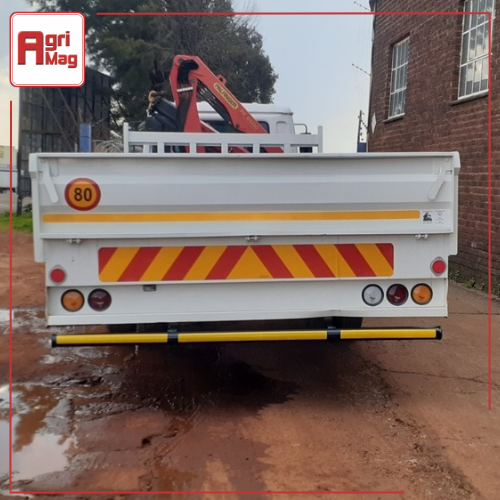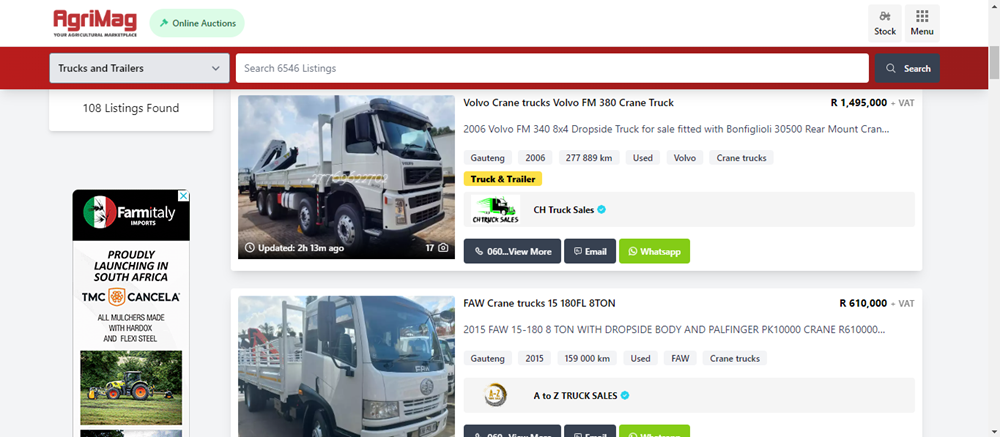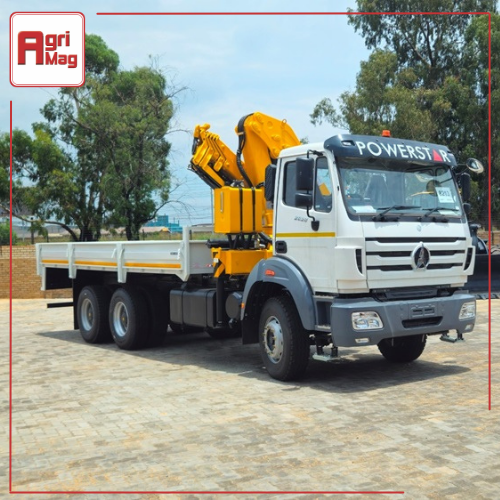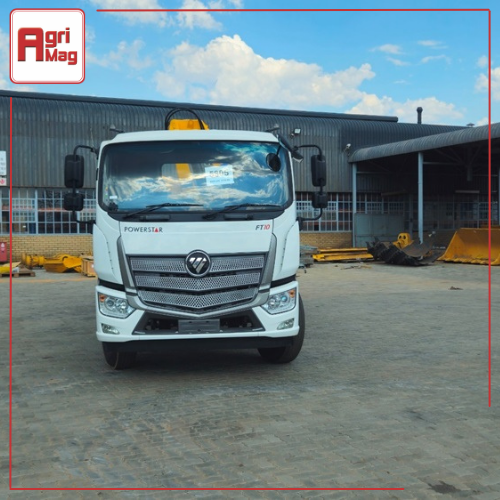
Ensuring Safety in Crane Truck Operations: Key Factors for the Market
Date: 27/11/2023
How can businesses ensure the safety of crane truck operations? As the construction and logistics industries continue to grow, crane trucks have become indispensable tools for lifting and transporting heavy loads. However, the complexity and potential hazards associated with this type of truck operations necessitate a rigorous focus on safety. This article explores key factors that companies must consider to ensure safe and efficient operations. Want to buy used trucks and trailers? Visit AgriMag to find listed equipment for sale.

Understanding Regulatory Requirements
The first step to ensuring safety in crane truck operations is understanding and adhering to the regulatory requirements set forth by the government. The Occupational Health and Safety Act (OHSA) and the National Road Traffic Act (NRTA) provide guidelines and standards for the operation and maintenance of these trucks. Compliance with these regulations is mandatory and helps in minimising risks associated with crane truck operations.
Importance of Proper Training
Proper training for crane truck operators is crucial. Operators must be well-versed in both the theoretical and practical aspects of the truck operations. Training should cover:
- Operational Skills: Maneuvering the crane truck, understanding load limits, and proper handling techniques.
- Safety Protocols: Knowledge of safety measures, emergency procedures, and the use of personal protective equipment (PPE).
- Regulatory Compliance: Understanding of legal requirements and best practices in the industry.
Training programs should be accredited and periodically updated to incorporate new safety standards and technological advancements.
Regular Maintenance and Inspections
Regular maintenance and inspections of these trucks are vital to ensure their safe operation. Maintenance schedules should include:
- Routine Checks: Daily inspections of the truck before use, checking for any visible damages or issues.
- Scheduled Maintenance: Regular servicing by qualified technicians to ensure all parts are functioning correctly and safely.
- Comprehensive Inspections: Periodic in-depth inspections to identify and rectify potential problems before they become hazardous.
Proper documentation of all maintenance activities is essential for compliance and tracking purposes.

Implementing Safety Protocols
Implementing robust safety protocols is a key factor in mitigating risks. These protocols should include:
- Site Assessments: Conducting thorough assessments of the worksite to identify potential hazards and plan their operations accordingly.
- Load Management: Ensuring that the load does not exceed the crane truck’s capacity and is properly secured to prevent accidents.
- Communication Systems: Establishing clear communication channels among all personnel involved in the operation, including the use of hand signals and two-way radios.
Use of Technology
Advancements in technology can significantly enhance the safety of crane truck operations. Some technologies to consider include:
- Load Moment Indicators (LMI): Devices that monitor the crane’s lifting capacity and provide warnings when the load exceeds safe limits.
- Anti-Collision Systems: Technologies that help prevent collisions by detecting obstacles and alerting the operator.
- Telematics: Systems that provide real-time data on the truck performance, helping in proactive maintenance and operational efficiency.
Fostering a Safety Culture
Creating a culture of safety within the organisation is essential. This involves:
- Leadership Commitment: Management should demonstrate a strong commitment to safety by providing the necessary resources and support for safety initiatives.
- Employee Involvement: Encouraging employees to participate in safety programs, report hazards, and suggest improvements.
- Continuous Improvement: Regularly reviewing and updating safety policies and procedures to adapt to new challenges and insights.
Ensuring safety in crane truck operations is critical for the well-being of workers and the success of projects. By understanding regulatory requirements, providing proper training, conducting regular maintenance, implementing safety protocols, leveraging technology, and fostering a safety culture, businesses can significantly reduce risks and enhance operational efficiency. Safety operations in crane trucks is not just a legal obligation but a fundamental aspect of responsible business practice that protects lives and ensures the longevity of equipment and projects. Wish to purchase pre-owned trailers and trucks? To find equipment for sale, visit AgriMag.
Categories:
Common category
Category Search:
Latest articles:

Top Irrigation Tips for Farmers Facing Water Restrictions

Understanding the Role of Truck Tractors in Logistics

Farming Equipment Upgrades for Small-Scale Farmers in South Africa


